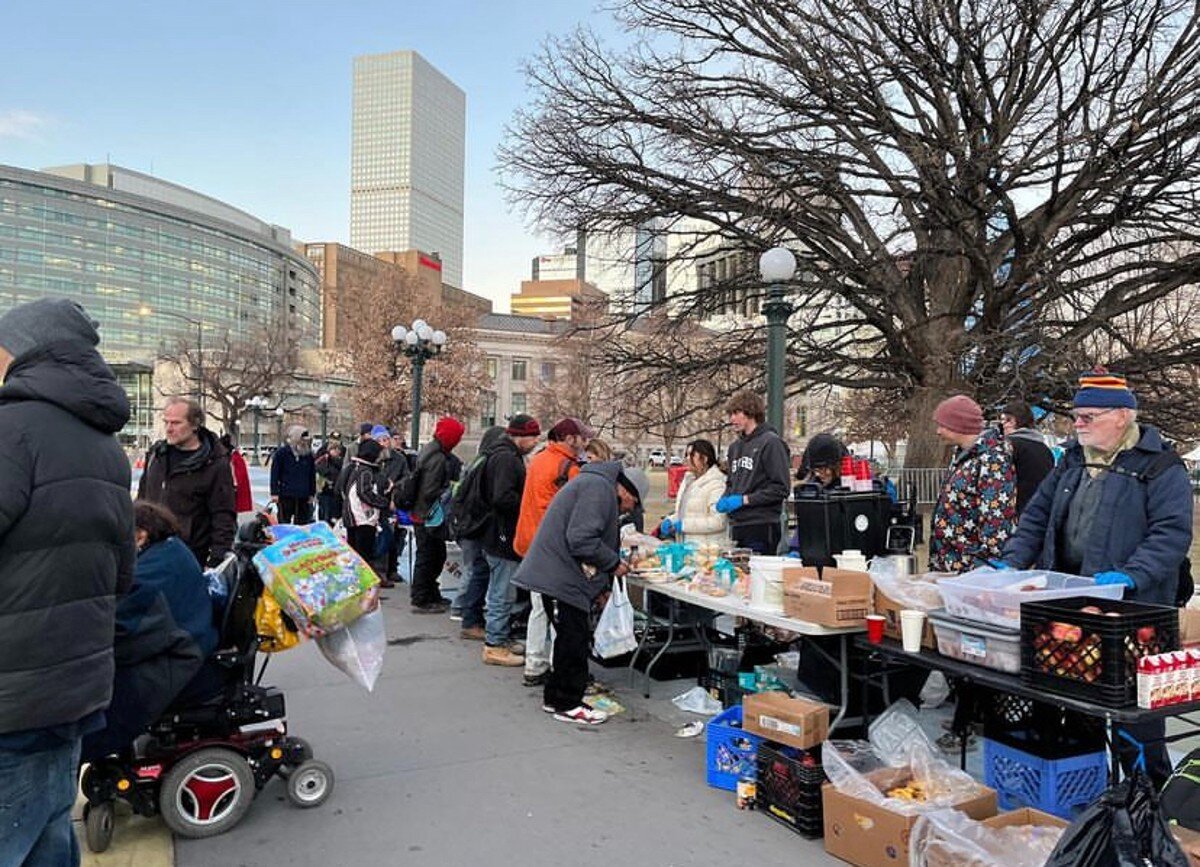Rethinking outreach: Mutual Aid Monday serves with no strings attached

DENVER — The scene is the same every Monday from 4 p.m. to 7 p.m. outside the Denver City and County Building.
Volunteers stand outside scooping pasta and soup into paper bowls, giving out bags of snacks and handing out camping gear to people experiencing homelessness in Denver.
The event is called Mutual Aid Monday. Several Denverites — some who were previously unhoused — started the weekly tradition two years ago, after protesting Denver Police Department sweeps of homeless encampments.
“We started it just out of the need that we needed to do something to help unhoused people. It was getting into the winter months and people were really cold,” said Kelsang Virya, a founder and Mutual Aid Monday volunteer. “It’s about helping your neighbors because then that helps you.”
As some volunteers organize food and outdoor supplies, Jess Wiederholt walks around carrying a red grocery bag full of clean needles and naloxone, a lifesaving drug that can reverse an opioid overdose. Her pockets are stuffed with packs of cigarettes.
Wiederholt --a volunteer -- neither smokes cigarettes nor injects drugs, but knows many unhoused residents do, as harsh conditions of living outside perpetuate cycles of mental illness and addiction. Rather than trying to force people who aren’t ready for sobriety into unwanted programs and withdrawals, Wiederholt passes out supplies to help those who use drugs do so safely.
“The really unique part of this is just the trust that we build, because folks can come here and it’s unconditional, they know it’s just community serving community,” Wiederholt said. “We don’t call the police. We don’t do things the unhoused don’t want us to do.”
Organizers hold the event on Monday evenings because that's when Denver City Council meets, and they see mutual aid as a form of protest to sweeps and other policies they believe are inhumane towards people experiencing homelessness.
"We know what happens at 4 p.m. as city council meets, and we believe the city should be doing more to care for the unhoused and we want to hold them accountable," Wiederholt said.
Unlike many programs serving unsheltered people, mutual aid requires no red tape, commitment to sobriety, employment applications or fulfillment of programs. Anyone can receive meals, snacks, clothing and supplies, regardless of their criminal history, sobriety or progression into housing.
And Wiederholt is clear: mutual aid is not charity.

Mutual Aid Monday volunteers handing out food and supplies. Image courtesy: Mutual Aid Monday
“We’re out here in the cold just like our unhoused area, and it’s just this model of walking alongside our neighbors,” Wiederholt said. “Charity is often very conditional and it goes with a large budget and a lot of paid workers. We’re all volunteers and work with whatever budget the community gives.”
Virya said mutual aid also separates itself from charity in that volunteers listen to people experiencing homelesness and act accordingly, rather than making assumptions about their needs.
“Sometimes organizations have dropped the ball on them and we try not to drop the ball on anybody,” Virya said. “We come down here and we have a community and they start to trust us. They approach us a lot easier.”
Mutual aid is messy. Volunteers move quickly, boxes are frantically shuffled in and out of the way, and organizers talk to recipients like they would friends or family members. Those who participate say that’s the point: mutual aid isn’t supposed to be organized and bureaucratic.
“It’s very messy, and I think it’s the best way to do anything because everybody gets to have a voice and everybody’s voice is equal,” Virya said. “We are trying to change the system, and we’re offering support so we can make it day by day.”
The Black Panther Party is widely credited as the founder of mutual aid, when members created the Free Breakfast for Children program in Oakland, Calif., to combat food insecurity among Black children in the area.
Denver’s Mutual Aid Monday volunteers say they took a page from past activists in advocating for marginalized communities, despite what they see as a lack of resources and sometimes roadblocks from government officials.
“I would like to see them stop the sweeps, and I would like to see them provide more services to the unhoused,” Virya said. “It seems like they have a lot of money, but they’re not boots-on-the-ground figuring out where it needs to go.”
Mutual aid recipients said they are grateful for the weekly services, as connecting with caseworkers can be difficult. Those living on the streets said frequent police sweeps have made it nearly impossible for them to retain their belongings, forcing them to get new sleeping bags and camp gear each week.
“Trying to get disability and things like that is impossible when you don’t have resources,” said Robert Moore, who has experienced homelessness for six years. “It’s hard to hold a job down when you’re sleeping on the streets.”
Even those who have housing say purchasing food and other essentials is nearly impossible, as prices continue to skyrocket with wages not keeping up.
“Being in the middle of downtown Denver, there’s nothing cheap to eat and there are no cheap places to shop, everything is just very expensive,” said Christopher Howard, a mutual aid recipient who has an apartment through the Colorado Coalition for the Homeless.
Virya said the work is urgent, especially as winter looms and bitter temperatures claim lives of those who live outside.
“We are trying to save lives by saving fingers and toes from frostbite,” Virya said. “It sounds like I’m being a drama queen here but that is seriously what we’re doing. We’re trying to save people’s lives, but then again, we’re trying to create community.”
Julio Sandoval is a multimedia journalist with Rocky Mountain PBS. You can reach him at juliosandoval@rmpbs.org.
Alison Berg is a multimedia journalist who can be reached at alisonberg@rmpbs.org. Her Twitter is @alison__berg.